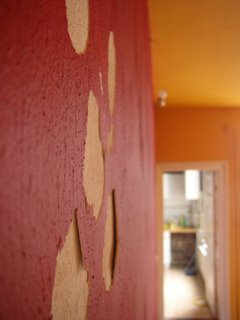And in the End

You may be strangely comforted to know that the Zolder was nothing but a corpse when we left it.
I mean no disrespect in saying this. On the contrary, I've come to a place of great respect for what the Zolder has meant to all of us. It was the home -- the womb, even -- that gave birth to an eternal part of us. And as I took my final stroll through the echoing caverns of the Zolder -- before descending those stairs one last time, before closing the door behind me and handing in my key -- I marvelled at the Zolder's beauty and cleanliness. Indeed, we left her with dignity and care. She was pristine and proper and magnificent...
But she was empty. Lifeless. Soulless.
I know that it's a bit macabre, but the best parallel that I've been able to draw is that of a body in a casket. Immaculately dressed, lying in a beautifully padded box in a room filled with flowers and brass fixtures -- the features of the face, the folded hands, the contours of the body are immediately recognizeable. Others may even be whispering how good she looks, how natural, how restful... But it doesn't seem real. More like wax than flesh. More like sculpture than person. And I think -- in spite of its intangibility and invisibility -- this is because of the exodus of the soul. Theologians can debate it, scientists can attempt to empiricize it, morticians can endeavor to mask it -- but I think we can all see it and understand it on an instinctive level: a body without a soul is not a person. It's just a body. A corpse.
And so it was with the Zolder.
I suppose it's sad to talk about the Zolder in this way. Sad and disturbing and maybe even a bit cruel. But that's not really the way I see it. Actually, I'm glad that the Zolder was nothing but a corpse when we left it.
That means we're taking all of the parts that were living along with us.
Our laughter, our songs of praise, our comraderie, our gezelligheid, our love for each other and for God -- it turns out that these elements of our church's soul are remarkably travelable. Even beyond the beautiful works of art and the sentimental keepsakes of the Zolder that were moved out and packed away in a temporary storage facility -- the life and essence of our community are transcendent. I saw it on the sidewalk in front of the building as we moved out on Wednesday. I saw it in the Cafe Zouk that evening, with a foursome from our home group huddled around a table in conversation. And I look forward to seeing it -- much more of it -- in the future.
The last song of the Beatles -- those troubadors of the 2oth Century -- closed with the conclusion: "And in the end, the love you take is equal to the love you make." And while the true spiritual depths of this dictum may be flawed (or at least incomplete), I can say that the Zolder made little love of its own accord. Rather, everything that the Zolder came to be was the result of God working through His people in Amsterdam. And as such, the Zolder has nothing of its own to take or claim. But we, the people of "Zolder50" -- following our pillar of cloud by day and fire by night -- walk away with the blood of life coursing through our veins and the very Spirit of God filling our souls, leaving the casket behind.


2 Comments:
Maybe these thoughts are meant for this people, here, at this time, because for many of them the buildings hold the meaning of "church" and "Christian" rather than the people themselves. Seeing that the church is people and not places, that the life of it is in God and not a structure, may open the hearts of many Dutch people.
what a beautiful and fitting description.
only the Spirit of God, manifest in and through His people, could transform Zolder50 the place into Zolder50 the people.
Post a Comment
<< Home